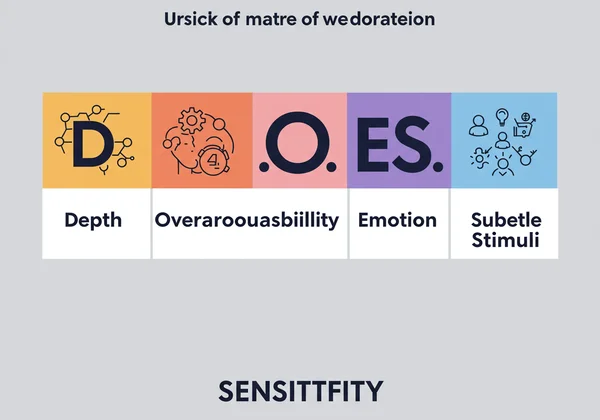HSP Test: Understanding Sensitive Strengths & Challenges
August 4, 2025 | By Eleanor Reed
Do you often feel everything more deeply than others? Do you notice subtle details in your environment, or find yourself easily overwhelmed by loud noises and busy crowds? If you've ever wondered, am I a highly sensitive person, you are not alone. This is a common experience for the 15-20% of the population who identify as a Highly Sensitive Person (HSP), a personality trait first researched by Dr. Elaine N. Aron. Understanding this trait is the first step toward self-acceptance and empowerment. This guide will explore the unique strengths and challenges of being highly sensitive, and how a definitive hsp test can illuminate your path. To begin your journey of self-discovery, you can start your free test today.
What It Means to Be a Highly Sensitive Person (HSP)
Being a Highly Sensitive Person is not a disorder or a weakness; it is a neutral, innate personality trait involving sensory processing sensitivity. Essentially, an HSP's brain is wired to process physical, emotional, and social stimuli more deeply. This heightened awareness can be a remarkable gift, but it also means that you may become overstimulated more quickly than non-HSPs.
Understanding your HSP traits is crucial for managing your energy and thriving in a world that often feels too loud and fast. It's about learning to honor your nervous system's unique calibration. The first step for many is to validate their feelings with a reliable sensory processing sensitivity test, which can provide clarity and a framework for understanding their experiences.

The Science Behind Sensitivity: Dr. Elaine Aron's Research
The term "Highly Sensitive Person" was popularized by psychologist Dr. Elaine N. Aron in the 1990s. Her pioneering research demonstrated that high sensitivity is a biological trait, not a learned behavior or a flaw. You can explore more about her foundational work and studies on her official website. Acknowledging the science behind the trait is empowering; it reframes "being too sensitive" into "being finely tuned," shifting the narrative from self-criticism to self-appreciation. The official HSP test we offer is based on her foundational studies.
The DOES Model: Unpacking Core HSP Traits
To better define the core aspects of the trait, Dr. Aron developed the D.O.E.S. acronym. This model provides a clear structure for understanding what it truly means to be an HSP. If you identify strongly with these four elements, it's a good indication you might be a highly sensitive person.
-
D - Depth of Processing: HSPs think deeply about everything. They process information more thoroughly, connecting and comparing new data with past experiences. This can lead to rich inner lives, but also a tendency to get stuck in overthinking.
-
O - Overarousability: Because they process so much, HSPs are more prone to feeling overstimulated or overwhelmed. A busy party, a tight deadline, or even a scratchy sweater can be enough to push their nervous system into overdrive. This is a key aspect explored in a
test for hsp. -
E - Emotionally Responsive & Empathetic: HSPs experience emotions, both positive and negative, with greater intensity. They also have high levels of empathy, often feeling the emotions of others as if they were their own. This contributes to their deep sense of HSP emotional intelligence.
-
S - Sensitive to Subtle Stimuli: HSPs notice the little things. They might be the first to notice a faint aroma, a subtle shift in someone's tone of voice, or a slight change in a room's decor. This sensitivity makes them highly intuitive and observant.

Embracing Your Highly Sensitive Strengths & Advantages
While the narrative around sensitivity often focuses on the difficulties, being an HSP comes with a wealth of hsp strengths. These highly sensitive advantages are superpowers in a world that desperately needs more depth, compassion, and awareness. Recognizing and nurturing these gifts is key to living a fulfilling life as an HSP.
Deep Processing & Intuition: Your Inner Wisdom
The HSP's tendency for depth of processing is not a bug; it's a feature. This ability to make connections that others miss fuels incredible HSP creativity and problem-solving skills. HSPs are often the innovators, artists, and visionaries who see the world from a unique and insightful perspective.
This deep thinking also cultivates a powerful intuition. By unconsciously processing subtle cues from their environment and past experiences, many HSPs develop a strong "gut feeling" that guides them. Trusting this inner wisdom can be one of the most empowering parts of the HSP journey.
High Empathy & Compassion: Connecting with Others
An HSP's high empathy is the cornerstone of their ability to form deep, meaningful connections. They are often described as thoughtful, compassionate, and caring friends, partners, and colleagues. This capacity for emotional resonance allows them to offer genuine support and understanding, strengthening HSP relationships.
This quality makes them exceptional leaders, counselors, teachers, and parents. They can anticipate the needs of others and create environments where people feel seen, heard, and valued. This profound ability to connect is a true advantage in both personal and professional spheres.

Navigating the Challenges of High Sensitivity
Of course, being highly sensitive also comes with a unique set of hsp challenges. The same nervous system that provides rich insights and empathy can also become a source of stress and exhaustion if not managed properly. The key is not to eliminate sensitivity, but to learn how to work with it. A good hsp personality test can give you personalized insights into your specific challenges.
Overwhelm & Overstimulation: Managing Your Environment
One of the most common struggles for HSPs is hsp overwhelm. Because they take in so much sensory information, they can easily experience sensory overload in environments that non-HSPs find perfectly manageable. Crowded malls, open-plan offices, and loud concerts can be incredibly draining.
Learning to manage your environment is crucial. This means recognizing your limits, scheduling downtime to decompress, creating a calming sanctuary at home, and setting boundaries to protect your energy. It's about giving yourself permission to step away when you need to recharge.

Emotional Responsiveness: Riding the Waves
Feeling emotions so intensely means that HSPs can be deeply moved by beauty and joy, but also profoundly affected by criticism, conflict, and sadness. This high emotional responsiveness can feel like being on a rollercoaster. Learning effective hsp emotional regulation strategies is essential for well-being.
Techniques like mindfulness, journaling, and spending time in nature can help ground you. It's also important to remember that your emotional depth is not a flaw. It is the source of your empathy and passion. The goal is to learn how to ride the waves of emotion without letting them capsize you. You can discover your traits to better understand your emotional landscape.
Your Journey to Self-Acceptance as a Highly Sensitive Person
Understanding that you are a Highly Sensitive Person is a transformative experience. It allows you to reframe your life story, seeing your perceived flaws as strengths in disguise. The journey involves embracing your deep processing, celebrating your empathy, and learning to honor your need for rest and quiet.
If this article resonates with you, the next step is to gain more clarity. An hsp test can provide the validation and insight you need to move forward with confidence. It’s an invaluable tool for self-exploration and empowerment. Are you ready to understand yourself on a deeper level? Take our free HSP test and unlock your personalized report.
Frequently Asked Questions About High Sensitivity
What are the characteristics of a highly sensitive person?
The main characteristics are captured by the D.O.E.S. model: Depth of processing, Overarousability (easily overwhelmed), Emotional responsiveness (and high empathy), and Sensitivity to subtle stimuli. HSPs are often creative, intuitive, and conscientious but may struggle with overstimulation.
How do you confirm HSP?
While self-identification is valid, the most reliable way to confirm the trait is by taking a scientifically-backed assessment. An official hsp test, like the one developed based on Dr. Elaine Aron's research, asks a series of questions about your experiences and reactions. You can take a free test on our website for an initial assessment.
What is an HSP test?
An HSP test is a self-report questionnaire designed to measure the degree to which you possess the trait of sensory processing sensitivity. It is not a clinical diagnosis but a tool for self-understanding. Our comprehensive highly sensitive person test provides a free summary and an optional, in-depth AI-powered report that details your strengths, challenges, and a personalized action plan.
Is HSP considered autism?
No, HSP is not a form of autism. While both can involve sensory sensitivities, they are distinct neurobiological profiles. Autism is a developmental disorder characterized by challenges in social communication and repetitive behaviors. HSP is a personality trait. Understanding the difference is crucial, and a professional consultation is recommended if you suspect autism.